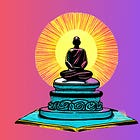Drug Dharma: Psychedelics & Zen Buddhism
Psychedelics offer a glimpse of profound wisdom, but the quick attainment of such insight is fleeting without the foundations of a disciplined, contemplative lifestyle.
Zen focuses on simplicity, naturalness, and direct experiential wisdom through meditation to attain enlightenment.
The idea is that the nature of reality is ineffable, so trying to explain or address it through intellectual discussion is futile. Profound but short-lived realizations — called "satori" — originate through direct experience gained during meditative practice.
In Zen, "direct experience" refers to an unmediated, sudden understanding of reality without the interference of conceptual thought or personal bias. It's a pure, undistorted awareness of the present moment — untainted by past memories or future anticipations. In this state, one can gain profound insights into the true nature of the mind and reality.
What Zen Buddhism offers is a slow, disciplined approach to wisdom.
Psychedelics offer the polar opposite —rapid, on-demand revelations through which one may get a glimpse at the fabric of reality.
In this post, I'm going to make one argument for the use of psychedelics, along with the major caveats and some simple tips to incorporate these substances into one's spiritual journey effectively.
Psychedelics: Generators of "Direct Experience"
In Zen practice, direct experience is cultivated through meditation. The practitioner sits in mindfulness meditation (zazen) without trying to interpret or conceptualize the experience.
The assertion in Zen is that, whether we know it or not, we're prisoners of our own minds — unwittingly trapped by a continuous inner dialogue that creates an all-consuming distortion of reality. We're in a sort of collective dream known as "maya" or “illusion."
Only after many hours of dedicated practice does one eventually hit the wall and surrender the illusion created by the ego. It is here that one meets direct experience — where the true nature of reality reveals itself.
If meditation opens the door to the nature of mind and reality — psychedelics kick you through it.
The other side of this door is a kaleidoscope of consciousness. Here, one has the opportunity to get a glimpse at the incomprehensible tapestry of a cosmic reality. In this place, one loses awareness of one's own being. The Japanese call this "mumyo." Claudio Naranjo, inventor of the Enneagram, calls it the "ontic void." Modern psychedelic researchers call it the "mystical experience."
Whatever you want to call it, the result leads to profound realizations of the impermanence and interconnectedness of all things, the true nature of consciousness, and the illusions constructed by the ego.
Psychedelics are a reliable means of getting to this place of cosmic clarity where boundaries dissolve and the self melds with the universe.
Attachment, Delusion, & Spiritual Bypassing
The major conflict between psychedelics and Zen comes down to attachment.
Just as we become attached to material possessions and identity, we also become attached to experience.
Psychedelics reliably provide us with glimpses of enlightenment (satori) — but as Lama Surya Das says, "it's easier to get enlightened than to stay enlightened."
Relying on psychedelics to produce hedonistic glimpses of enlightenment is likened to a sort of "spiritual masturbation."
When used this way, it's easy to see how psychedelics can lead to further delusion and maya — rather than clarity and satori.
If one needs a tool to experience spiritual insight, is it truly insight? Or is it just another layer of disillusionment and ego?
Lama Surya Das puts it nicely:
"One downside of psychedelic experiences is that you may think you're there when you're not really there. I diagnose this as "premature immaculation," a condition that can paralyze the further impetus of your spiritual journey."
Psychedelics, when used incorrectly, serve as a form of spiritual bypassing — a concept where one becomes disillusioned into thinking they're advancing their spiritual practice but are, in reality, moving further away from true awareness and detachment.
Commitment to Practice
Psychedelic experiences, though profound, are fleeting and unpredictable. While they offer valuable insights, these revelations can easily fade without intentional integration and reinforcement.
In contrast, Zen Buddhism represents a sustained journey of commitment. Though insights from Zen meditation can also be transient, their depth and endurance are more likely to grow and deepen over time. True wisdom in Zen is not just acquired but cultivated, with insights slowly assimilated into a broader understanding and self-evolution.
"Yes, awakening comes in a moment, but living it, stabilizing it can take months, years, and lifetimes." — Jack Kornfield.
"When You Get The Message, Hang Up The Phone"
Psychedelics are reliable catalysts for direct experience and insight, but they shouldn't be the cornerstone of prolonged spiritual growth.
Use them, learn to "let go," and allow the insights received to leave their mark and then dissipate. Avoid clinging to these insights.
Alan Watts, a foremost interpreter of Eastern philosophies to the West, once said this about the use of psychedelics:
"If you get the message, hang up the phone. For psychedelic drugs are simply instruments, like microscopes, telescopes, and telephones. The biologist does not sit with eye permanently glued to the microscope, he goes away and works on what he has seen."
Pharmacology-based spirituality lacks the framework required to understand these experiences and offers a temptation to overvalue them. The intense and immediate revelations from psychedelics might inadvertently amplify the ego — deepening one's attachment to unique experiences and psychoactive substances. This can manifest as ego inflation and spiritual bypassing.
That said, many people do find value in the insights gained from responsible, respectful use of psychedelics, particularly when those experiences are approached with the kind of mindful, non-attached awareness cultivated in Zen practice.
With proper wisdom (Prajna), skillful means (Upaya), purpose (Set), and appropriate context (Setting) — mother nature offers us valuable tools for self-realization in the form of psychedelic chemistry.
The Zen master Seung Sahn encapsulated the essence of this debate perfectly when asked what he thought about using drugs to help in the quest for self-knowledge. He said:
"Yes, there are special medicines, which, if taken with the proper attitude, can facilitate self-realization. But if you have the proper attitude, you can take anything — take a walk, or a bath."








🙏🍄